Strategic Planning for Hospitality Industry: LT6018GN Report
VerifiedAdded on 2023/01/17
|12
|3726
|24
Report
AI Summary
This report critically analyzes strategic planning within the hospitality industry, using Premier Inn London Kew Bridge Hotel as a case study. It delves into factors influencing successful strategy implementation, including leadership, structural design, information systems, and human resources. The report evaluates performance metrics like Critical Success Factors (CSF) and Key Performance Indicators (KPI), assessing their impact on business effectiveness. Additionally, it explores key elements in managing strategic change, providing insights into leading various types of strategic change within the dynamic hospitality sector. The analysis provides a comprehensive understanding of the strategic planning process and its practical application within the industry.
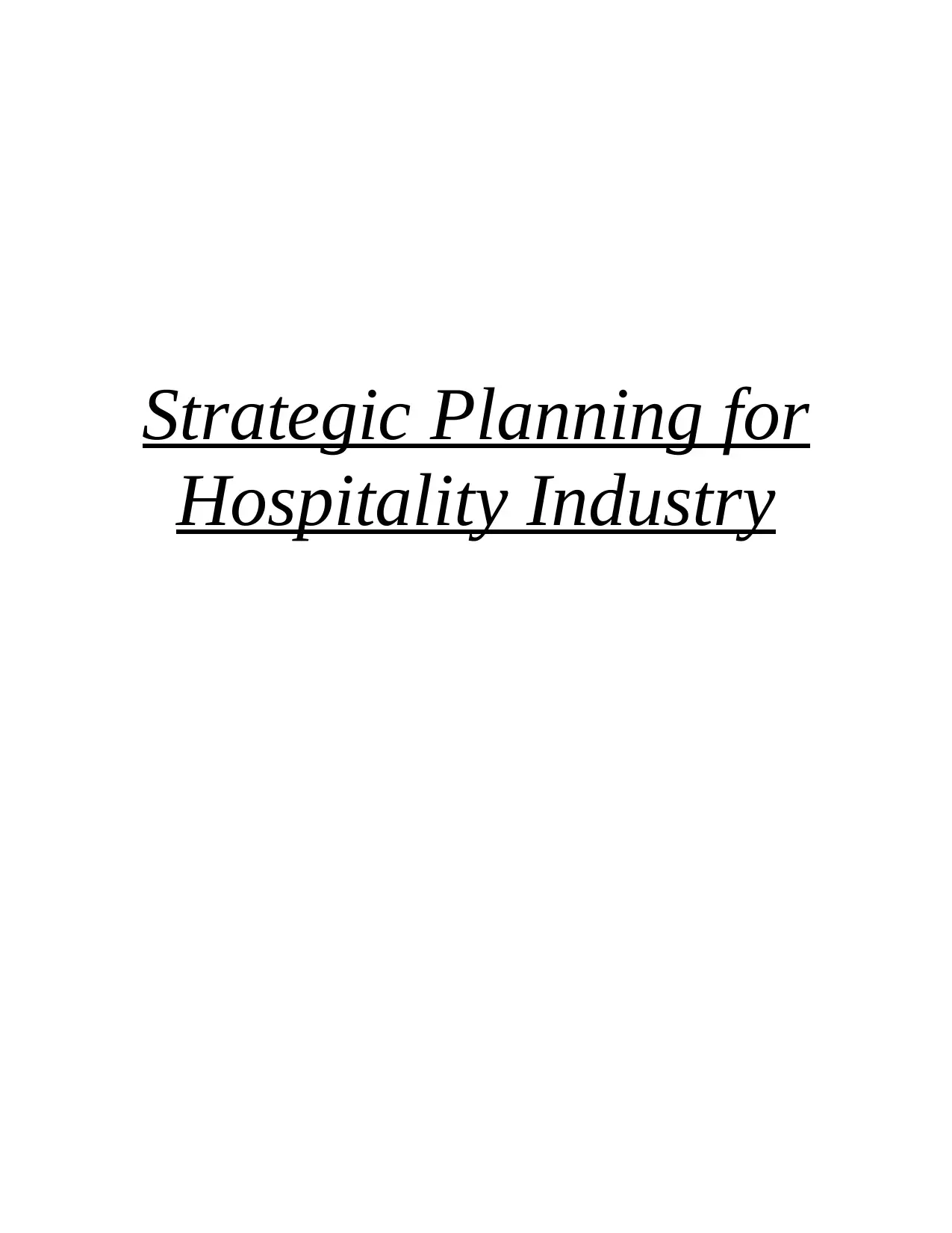
Strategic Planning for
Hospitality Industry
Hospitality Industry
Paraphrase This Document
Need a fresh take? Get an instant paraphrase of this document with our AI Paraphraser
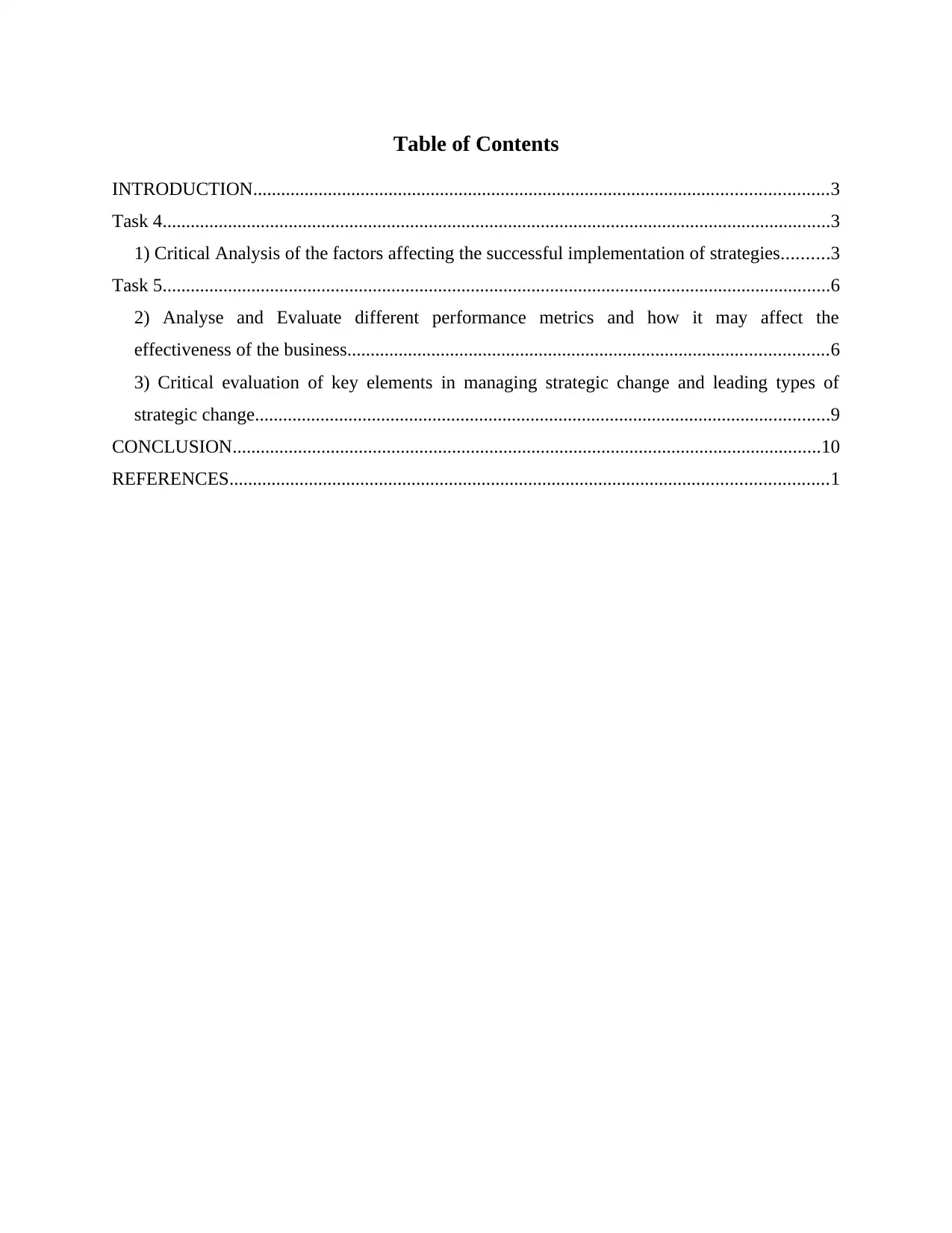
Table of Contents
INTRODUCTION...........................................................................................................................3
Task 4...............................................................................................................................................3
1) Critical Analysis of the factors affecting the successful implementation of strategies..........3
Task 5...............................................................................................................................................6
2) Analyse and Evaluate different performance metrics and how it may affect the
effectiveness of the business.......................................................................................................6
3) Critical evaluation of key elements in managing strategic change and leading types of
strategic change...........................................................................................................................9
CONCLUSION..............................................................................................................................10
REFERENCES................................................................................................................................1
INTRODUCTION...........................................................................................................................3
Task 4...............................................................................................................................................3
1) Critical Analysis of the factors affecting the successful implementation of strategies..........3
Task 5...............................................................................................................................................6
2) Analyse and Evaluate different performance metrics and how it may affect the
effectiveness of the business.......................................................................................................6
3) Critical evaluation of key elements in managing strategic change and leading types of
strategic change...........................................................................................................................9
CONCLUSION..............................................................................................................................10
REFERENCES................................................................................................................................1

⊘ This is a preview!⊘
Do you want full access?
Subscribe today to unlock all pages.

Trusted by 1+ million students worldwide
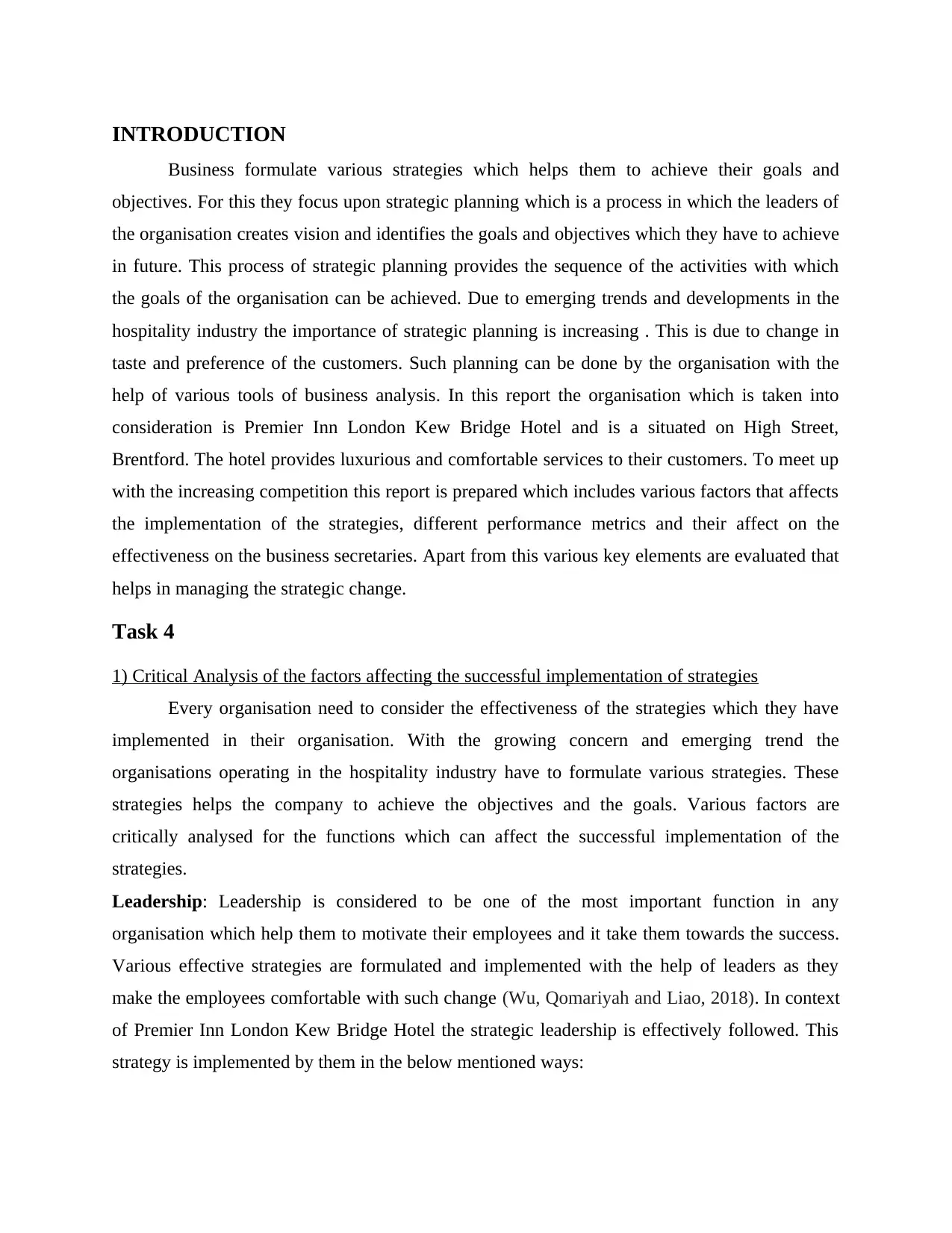
INTRODUCTION
Business formulate various strategies which helps them to achieve their goals and
objectives. For this they focus upon strategic planning which is a process in which the leaders of
the organisation creates vision and identifies the goals and objectives which they have to achieve
in future. This process of strategic planning provides the sequence of the activities with which
the goals of the organisation can be achieved. Due to emerging trends and developments in the
hospitality industry the importance of strategic planning is increasing . This is due to change in
taste and preference of the customers. Such planning can be done by the organisation with the
help of various tools of business analysis. In this report the organisation which is taken into
consideration is Premier Inn London Kew Bridge Hotel and is a situated on High Street,
Brentford. The hotel provides luxurious and comfortable services to their customers. To meet up
with the increasing competition this report is prepared which includes various factors that affects
the implementation of the strategies, different performance metrics and their affect on the
effectiveness on the business secretaries. Apart from this various key elements are evaluated that
helps in managing the strategic change.
Task 4
1) Critical Analysis of the factors affecting the successful implementation of strategies
Every organisation need to consider the effectiveness of the strategies which they have
implemented in their organisation. With the growing concern and emerging trend the
organisations operating in the hospitality industry have to formulate various strategies. These
strategies helps the company to achieve the objectives and the goals. Various factors are
critically analysed for the functions which can affect the successful implementation of the
strategies.
Leadership: Leadership is considered to be one of the most important function in any
organisation which help them to motivate their employees and it take them towards the success.
Various effective strategies are formulated and implemented with the help of leaders as they
make the employees comfortable with such change (Wu, Qomariyah and Liao, 2018). In context
of Premier Inn London Kew Bridge Hotel the strategic leadership is effectively followed. This
strategy is implemented by them in the below mentioned ways:
Business formulate various strategies which helps them to achieve their goals and
objectives. For this they focus upon strategic planning which is a process in which the leaders of
the organisation creates vision and identifies the goals and objectives which they have to achieve
in future. This process of strategic planning provides the sequence of the activities with which
the goals of the organisation can be achieved. Due to emerging trends and developments in the
hospitality industry the importance of strategic planning is increasing . This is due to change in
taste and preference of the customers. Such planning can be done by the organisation with the
help of various tools of business analysis. In this report the organisation which is taken into
consideration is Premier Inn London Kew Bridge Hotel and is a situated on High Street,
Brentford. The hotel provides luxurious and comfortable services to their customers. To meet up
with the increasing competition this report is prepared which includes various factors that affects
the implementation of the strategies, different performance metrics and their affect on the
effectiveness on the business secretaries. Apart from this various key elements are evaluated that
helps in managing the strategic change.
Task 4
1) Critical Analysis of the factors affecting the successful implementation of strategies
Every organisation need to consider the effectiveness of the strategies which they have
implemented in their organisation. With the growing concern and emerging trend the
organisations operating in the hospitality industry have to formulate various strategies. These
strategies helps the company to achieve the objectives and the goals. Various factors are
critically analysed for the functions which can affect the successful implementation of the
strategies.
Leadership: Leadership is considered to be one of the most important function in any
organisation which help them to motivate their employees and it take them towards the success.
Various effective strategies are formulated and implemented with the help of leaders as they
make the employees comfortable with such change (Wu, Qomariyah and Liao, 2018). In context
of Premier Inn London Kew Bridge Hotel the strategic leadership is effectively followed. This
strategy is implemented by them in the below mentioned ways:
Paraphrase This Document
Need a fresh take? Get an instant paraphrase of this document with our AI Paraphraser
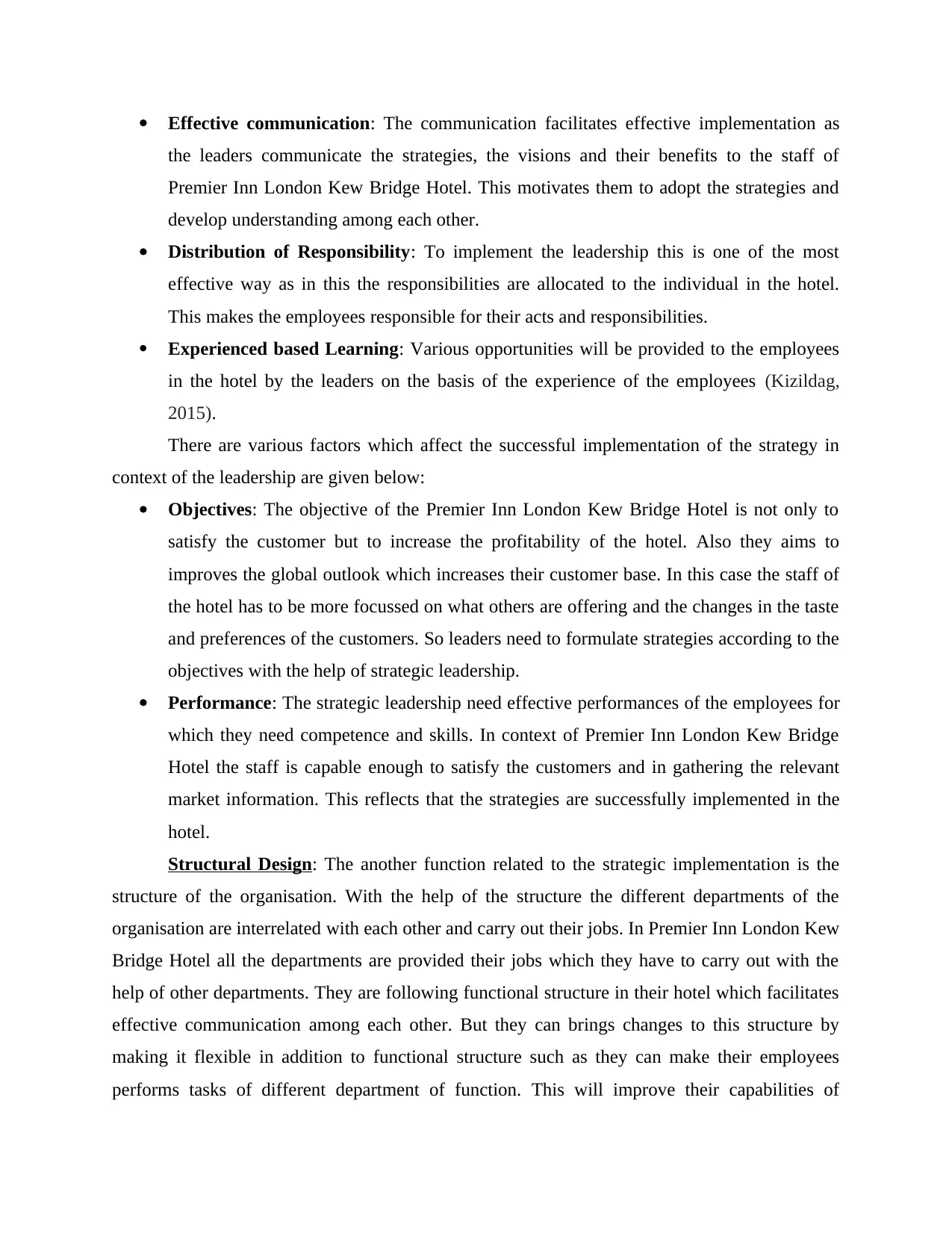
Effective communication: The communication facilitates effective implementation as
the leaders communicate the strategies, the visions and their benefits to the staff of
Premier Inn London Kew Bridge Hotel. This motivates them to adopt the strategies and
develop understanding among each other.
Distribution of Responsibility: To implement the leadership this is one of the most
effective way as in this the responsibilities are allocated to the individual in the hotel.
This makes the employees responsible for their acts and responsibilities.
Experienced based Learning: Various opportunities will be provided to the employees
in the hotel by the leaders on the basis of the experience of the employees (Kizildag,
2015).
There are various factors which affect the successful implementation of the strategy in
context of the leadership are given below:
Objectives: The objective of the Premier Inn London Kew Bridge Hotel is not only to
satisfy the customer but to increase the profitability of the hotel. Also they aims to
improves the global outlook which increases their customer base. In this case the staff of
the hotel has to be more focussed on what others are offering and the changes in the taste
and preferences of the customers. So leaders need to formulate strategies according to the
objectives with the help of strategic leadership.
Performance: The strategic leadership need effective performances of the employees for
which they need competence and skills. In context of Premier Inn London Kew Bridge
Hotel the staff is capable enough to satisfy the customers and in gathering the relevant
market information. This reflects that the strategies are successfully implemented in the
hotel.
Structural Design: The another function related to the strategic implementation is the
structure of the organisation. With the help of the structure the different departments of the
organisation are interrelated with each other and carry out their jobs. In Premier Inn London Kew
Bridge Hotel all the departments are provided their jobs which they have to carry out with the
help of other departments. They are following functional structure in their hotel which facilitates
effective communication among each other. But they can brings changes to this structure by
making it flexible in addition to functional structure such as they can make their employees
performs tasks of different department of function. This will improve their capabilities of
the leaders communicate the strategies, the visions and their benefits to the staff of
Premier Inn London Kew Bridge Hotel. This motivates them to adopt the strategies and
develop understanding among each other.
Distribution of Responsibility: To implement the leadership this is one of the most
effective way as in this the responsibilities are allocated to the individual in the hotel.
This makes the employees responsible for their acts and responsibilities.
Experienced based Learning: Various opportunities will be provided to the employees
in the hotel by the leaders on the basis of the experience of the employees (Kizildag,
2015).
There are various factors which affect the successful implementation of the strategy in
context of the leadership are given below:
Objectives: The objective of the Premier Inn London Kew Bridge Hotel is not only to
satisfy the customer but to increase the profitability of the hotel. Also they aims to
improves the global outlook which increases their customer base. In this case the staff of
the hotel has to be more focussed on what others are offering and the changes in the taste
and preferences of the customers. So leaders need to formulate strategies according to the
objectives with the help of strategic leadership.
Performance: The strategic leadership need effective performances of the employees for
which they need competence and skills. In context of Premier Inn London Kew Bridge
Hotel the staff is capable enough to satisfy the customers and in gathering the relevant
market information. This reflects that the strategies are successfully implemented in the
hotel.
Structural Design: The another function related to the strategic implementation is the
structure of the organisation. With the help of the structure the different departments of the
organisation are interrelated with each other and carry out their jobs. In Premier Inn London Kew
Bridge Hotel all the departments are provided their jobs which they have to carry out with the
help of other departments. They are following functional structure in their hotel which facilitates
effective communication among each other. But they can brings changes to this structure by
making it flexible in addition to functional structure such as they can make their employees
performs tasks of different department of function. This will improve their capabilities of
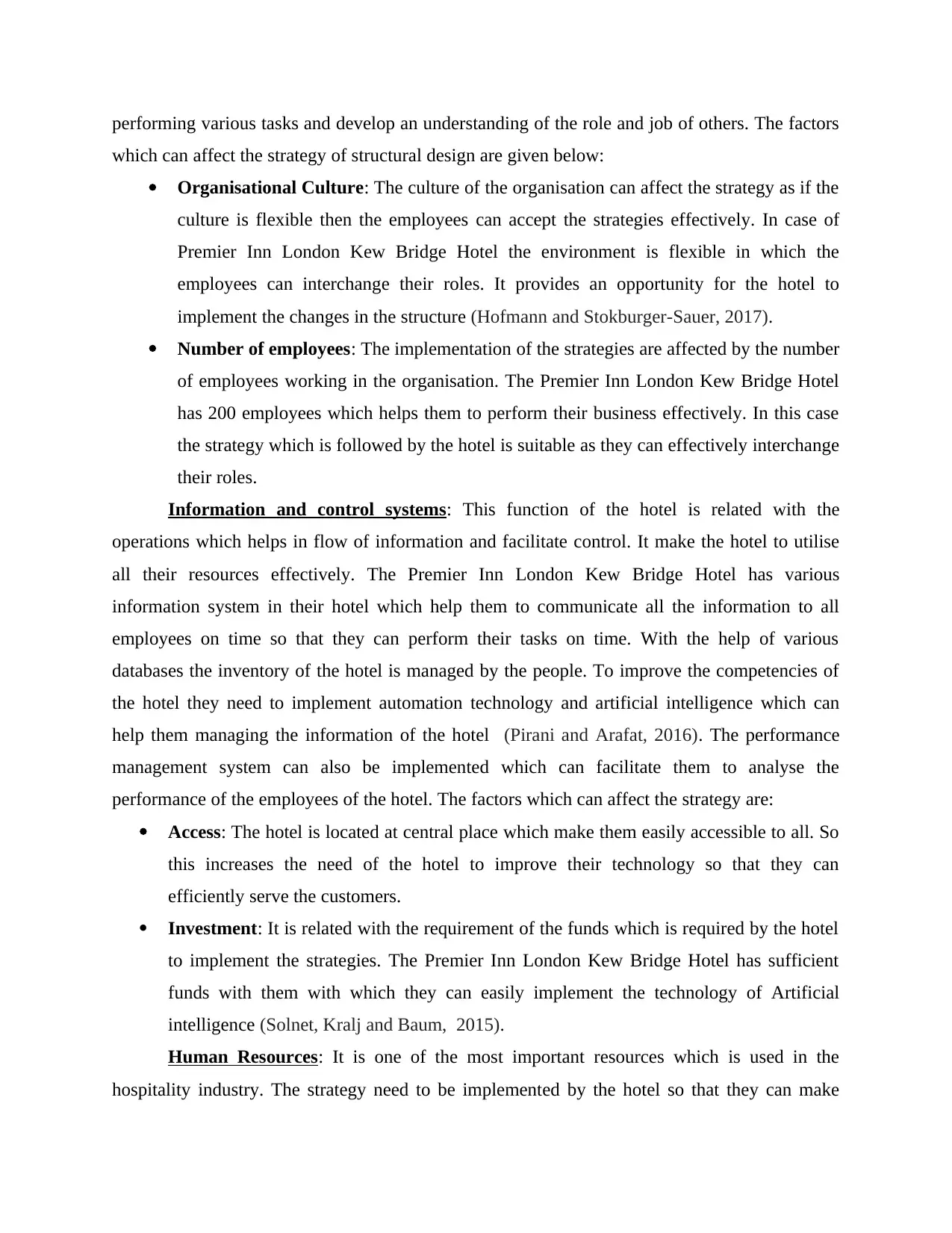
performing various tasks and develop an understanding of the role and job of others. The factors
which can affect the strategy of structural design are given below:
Organisational Culture: The culture of the organisation can affect the strategy as if the
culture is flexible then the employees can accept the strategies effectively. In case of
Premier Inn London Kew Bridge Hotel the environment is flexible in which the
employees can interchange their roles. It provides an opportunity for the hotel to
implement the changes in the structure (Hofmann and Stokburger-Sauer, 2017).
Number of employees: The implementation of the strategies are affected by the number
of employees working in the organisation. The Premier Inn London Kew Bridge Hotel
has 200 employees which helps them to perform their business effectively. In this case
the strategy which is followed by the hotel is suitable as they can effectively interchange
their roles.
Information and control systems: This function of the hotel is related with the
operations which helps in flow of information and facilitate control. It make the hotel to utilise
all their resources effectively. The Premier Inn London Kew Bridge Hotel has various
information system in their hotel which help them to communicate all the information to all
employees on time so that they can perform their tasks on time. With the help of various
databases the inventory of the hotel is managed by the people. To improve the competencies of
the hotel they need to implement automation technology and artificial intelligence which can
help them managing the information of the hotel (Pirani and Arafat, 2016). The performance
management system can also be implemented which can facilitate them to analyse the
performance of the employees of the hotel. The factors which can affect the strategy are:
Access: The hotel is located at central place which make them easily accessible to all. So
this increases the need of the hotel to improve their technology so that they can
efficiently serve the customers.
Investment: It is related with the requirement of the funds which is required by the hotel
to implement the strategies. The Premier Inn London Kew Bridge Hotel has sufficient
funds with them with which they can easily implement the technology of Artificial
intelligence (Solnet, Kralj and Baum, 2015).
Human Resources: It is one of the most important resources which is used in the
hospitality industry. The strategy need to be implemented by the hotel so that they can make
which can affect the strategy of structural design are given below:
Organisational Culture: The culture of the organisation can affect the strategy as if the
culture is flexible then the employees can accept the strategies effectively. In case of
Premier Inn London Kew Bridge Hotel the environment is flexible in which the
employees can interchange their roles. It provides an opportunity for the hotel to
implement the changes in the structure (Hofmann and Stokburger-Sauer, 2017).
Number of employees: The implementation of the strategies are affected by the number
of employees working in the organisation. The Premier Inn London Kew Bridge Hotel
has 200 employees which helps them to perform their business effectively. In this case
the strategy which is followed by the hotel is suitable as they can effectively interchange
their roles.
Information and control systems: This function of the hotel is related with the
operations which helps in flow of information and facilitate control. It make the hotel to utilise
all their resources effectively. The Premier Inn London Kew Bridge Hotel has various
information system in their hotel which help them to communicate all the information to all
employees on time so that they can perform their tasks on time. With the help of various
databases the inventory of the hotel is managed by the people. To improve the competencies of
the hotel they need to implement automation technology and artificial intelligence which can
help them managing the information of the hotel (Pirani and Arafat, 2016). The performance
management system can also be implemented which can facilitate them to analyse the
performance of the employees of the hotel. The factors which can affect the strategy are:
Access: The hotel is located at central place which make them easily accessible to all. So
this increases the need of the hotel to improve their technology so that they can
efficiently serve the customers.
Investment: It is related with the requirement of the funds which is required by the hotel
to implement the strategies. The Premier Inn London Kew Bridge Hotel has sufficient
funds with them with which they can easily implement the technology of Artificial
intelligence (Solnet, Kralj and Baum, 2015).
Human Resources: It is one of the most important resources which is used in the
hospitality industry. The strategy need to be implemented by the hotel so that they can make
⊘ This is a preview!⊘
Do you want full access?
Subscribe today to unlock all pages.

Trusted by 1+ million students worldwide
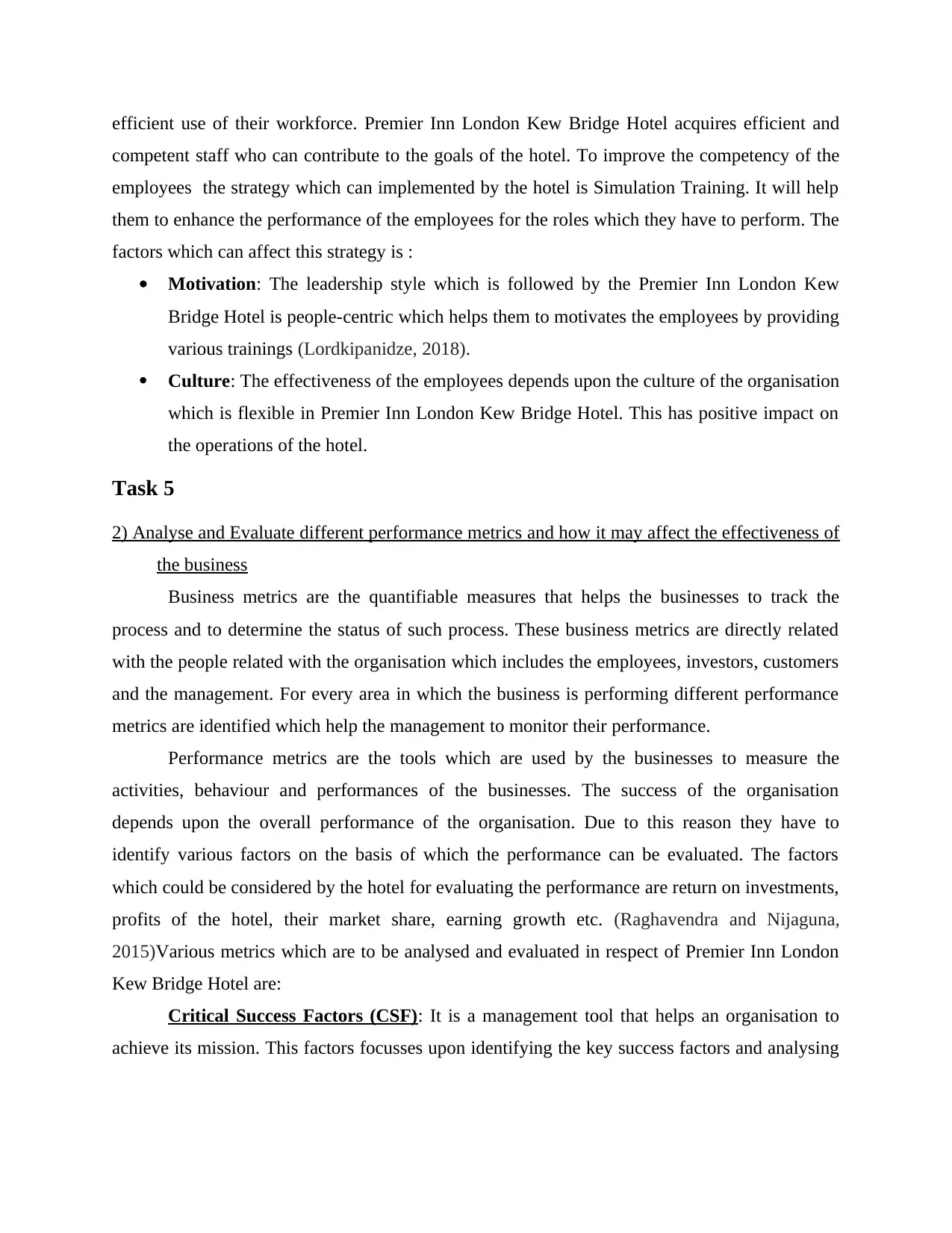
efficient use of their workforce. Premier Inn London Kew Bridge Hotel acquires efficient and
competent staff who can contribute to the goals of the hotel. To improve the competency of the
employees the strategy which can implemented by the hotel is Simulation Training. It will help
them to enhance the performance of the employees for the roles which they have to perform. The
factors which can affect this strategy is :
Motivation: The leadership style which is followed by the Premier Inn London Kew
Bridge Hotel is people-centric which helps them to motivates the employees by providing
various trainings (Lordkipanidze, 2018).
Culture: The effectiveness of the employees depends upon the culture of the organisation
which is flexible in Premier Inn London Kew Bridge Hotel. This has positive impact on
the operations of the hotel.
Task 5
2) Analyse and Evaluate different performance metrics and how it may affect the effectiveness of
the business
Business metrics are the quantifiable measures that helps the businesses to track the
process and to determine the status of such process. These business metrics are directly related
with the people related with the organisation which includes the employees, investors, customers
and the management. For every area in which the business is performing different performance
metrics are identified which help the management to monitor their performance.
Performance metrics are the tools which are used by the businesses to measure the
activities, behaviour and performances of the businesses. The success of the organisation
depends upon the overall performance of the organisation. Due to this reason they have to
identify various factors on the basis of which the performance can be evaluated. The factors
which could be considered by the hotel for evaluating the performance are return on investments,
profits of the hotel, their market share, earning growth etc. (Raghavendra and Nijaguna,
2015)Various metrics which are to be analysed and evaluated in respect of Premier Inn London
Kew Bridge Hotel are:
Critical Success Factors (CSF): It is a management tool that helps an organisation to
achieve its mission. This factors focusses upon identifying the key success factors and analysing
competent staff who can contribute to the goals of the hotel. To improve the competency of the
employees the strategy which can implemented by the hotel is Simulation Training. It will help
them to enhance the performance of the employees for the roles which they have to perform. The
factors which can affect this strategy is :
Motivation: The leadership style which is followed by the Premier Inn London Kew
Bridge Hotel is people-centric which helps them to motivates the employees by providing
various trainings (Lordkipanidze, 2018).
Culture: The effectiveness of the employees depends upon the culture of the organisation
which is flexible in Premier Inn London Kew Bridge Hotel. This has positive impact on
the operations of the hotel.
Task 5
2) Analyse and Evaluate different performance metrics and how it may affect the effectiveness of
the business
Business metrics are the quantifiable measures that helps the businesses to track the
process and to determine the status of such process. These business metrics are directly related
with the people related with the organisation which includes the employees, investors, customers
and the management. For every area in which the business is performing different performance
metrics are identified which help the management to monitor their performance.
Performance metrics are the tools which are used by the businesses to measure the
activities, behaviour and performances of the businesses. The success of the organisation
depends upon the overall performance of the organisation. Due to this reason they have to
identify various factors on the basis of which the performance can be evaluated. The factors
which could be considered by the hotel for evaluating the performance are return on investments,
profits of the hotel, their market share, earning growth etc. (Raghavendra and Nijaguna,
2015)Various metrics which are to be analysed and evaluated in respect of Premier Inn London
Kew Bridge Hotel are:
Critical Success Factors (CSF): It is a management tool that helps an organisation to
achieve its mission. This factors focusses upon identifying the key success factors and analysing
Paraphrase This Document
Need a fresh take? Get an instant paraphrase of this document with our AI Paraphraser
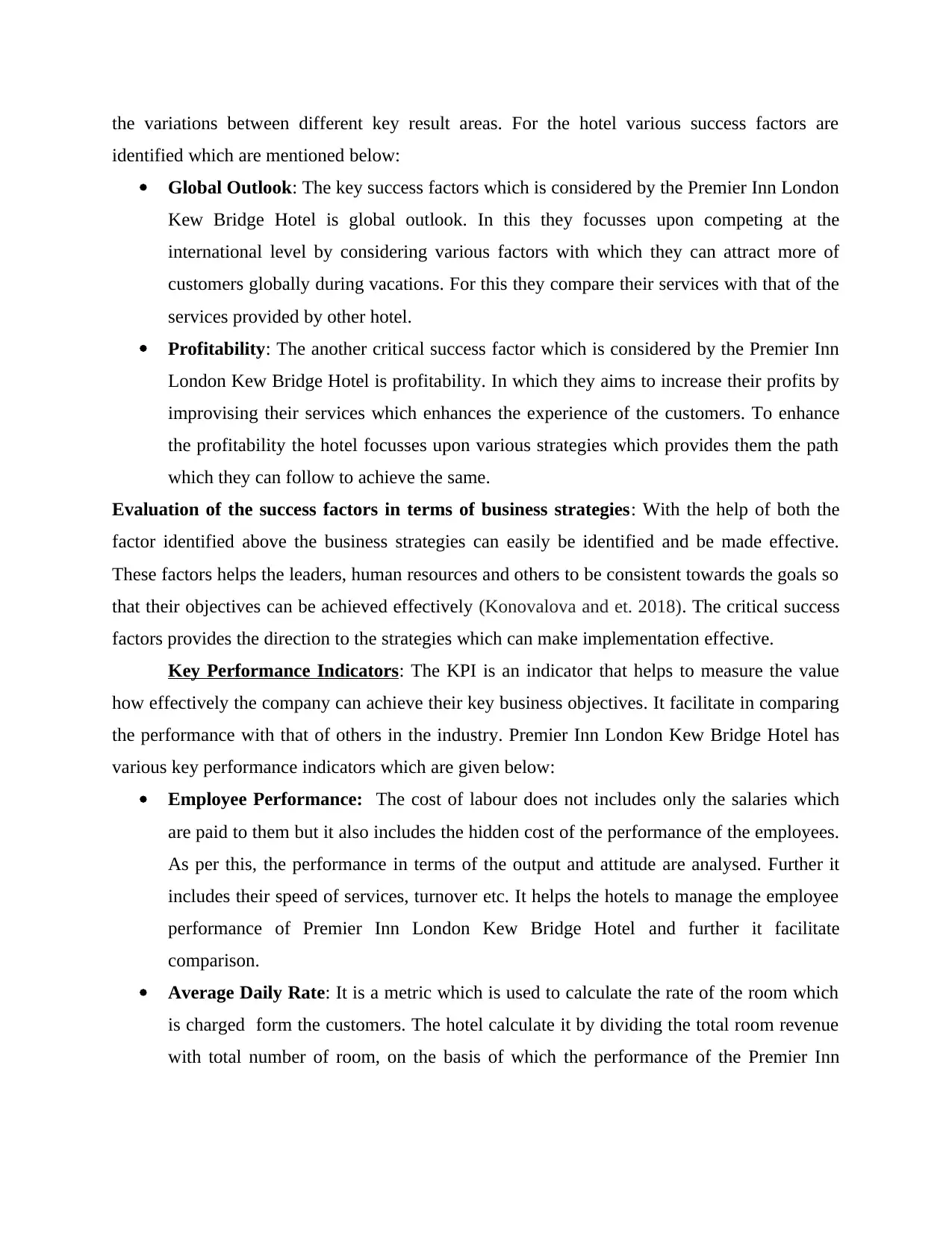
the variations between different key result areas. For the hotel various success factors are
identified which are mentioned below:
Global Outlook: The key success factors which is considered by the Premier Inn London
Kew Bridge Hotel is global outlook. In this they focusses upon competing at the
international level by considering various factors with which they can attract more of
customers globally during vacations. For this they compare their services with that of the
services provided by other hotel.
Profitability: The another critical success factor which is considered by the Premier Inn
London Kew Bridge Hotel is profitability. In which they aims to increase their profits by
improvising their services which enhances the experience of the customers. To enhance
the profitability the hotel focusses upon various strategies which provides them the path
which they can follow to achieve the same.
Evaluation of the success factors in terms of business strategies: With the help of both the
factor identified above the business strategies can easily be identified and be made effective.
These factors helps the leaders, human resources and others to be consistent towards the goals so
that their objectives can be achieved effectively (Konovalova and et. 2018). The critical success
factors provides the direction to the strategies which can make implementation effective.
Key Performance Indicators: The KPI is an indicator that helps to measure the value
how effectively the company can achieve their key business objectives. It facilitate in comparing
the performance with that of others in the industry. Premier Inn London Kew Bridge Hotel has
various key performance indicators which are given below:
Employee Performance: The cost of labour does not includes only the salaries which
are paid to them but it also includes the hidden cost of the performance of the employees.
As per this, the performance in terms of the output and attitude are analysed. Further it
includes their speed of services, turnover etc. It helps the hotels to manage the employee
performance of Premier Inn London Kew Bridge Hotel and further it facilitate
comparison.
Average Daily Rate: It is a metric which is used to calculate the rate of the room which
is charged form the customers. The hotel calculate it by dividing the total room revenue
with total number of room, on the basis of which the performance of the Premier Inn
identified which are mentioned below:
Global Outlook: The key success factors which is considered by the Premier Inn London
Kew Bridge Hotel is global outlook. In this they focusses upon competing at the
international level by considering various factors with which they can attract more of
customers globally during vacations. For this they compare their services with that of the
services provided by other hotel.
Profitability: The another critical success factor which is considered by the Premier Inn
London Kew Bridge Hotel is profitability. In which they aims to increase their profits by
improvising their services which enhances the experience of the customers. To enhance
the profitability the hotel focusses upon various strategies which provides them the path
which they can follow to achieve the same.
Evaluation of the success factors in terms of business strategies: With the help of both the
factor identified above the business strategies can easily be identified and be made effective.
These factors helps the leaders, human resources and others to be consistent towards the goals so
that their objectives can be achieved effectively (Konovalova and et. 2018). The critical success
factors provides the direction to the strategies which can make implementation effective.
Key Performance Indicators: The KPI is an indicator that helps to measure the value
how effectively the company can achieve their key business objectives. It facilitate in comparing
the performance with that of others in the industry. Premier Inn London Kew Bridge Hotel has
various key performance indicators which are given below:
Employee Performance: The cost of labour does not includes only the salaries which
are paid to them but it also includes the hidden cost of the performance of the employees.
As per this, the performance in terms of the output and attitude are analysed. Further it
includes their speed of services, turnover etc. It helps the hotels to manage the employee
performance of Premier Inn London Kew Bridge Hotel and further it facilitate
comparison.
Average Daily Rate: It is a metric which is used to calculate the rate of the room which
is charged form the customers. The hotel calculate it by dividing the total room revenue
with total number of room, on the basis of which the performance of the Premier Inn
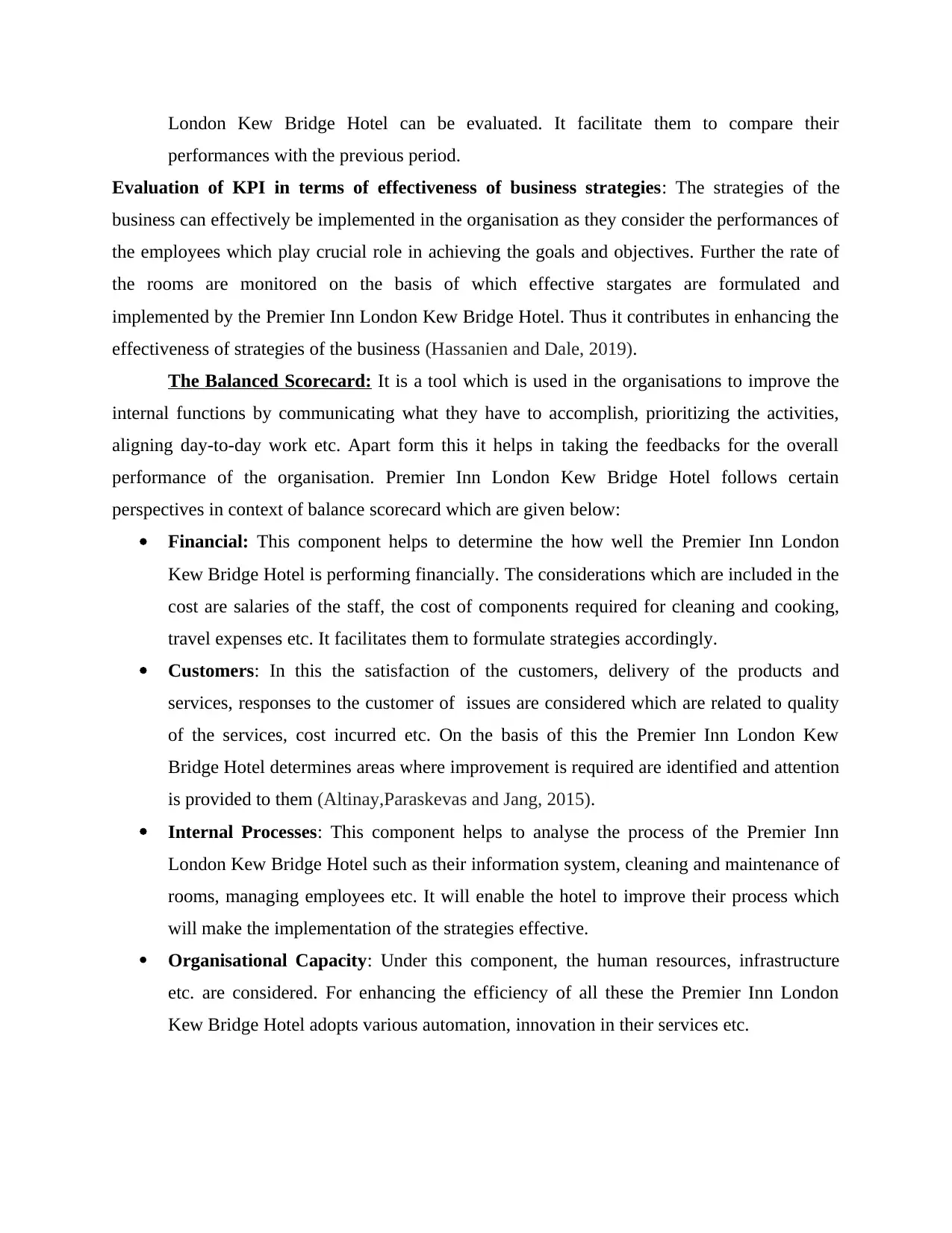
London Kew Bridge Hotel can be evaluated. It facilitate them to compare their
performances with the previous period.
Evaluation of KPI in terms of effectiveness of business strategies: The strategies of the
business can effectively be implemented in the organisation as they consider the performances of
the employees which play crucial role in achieving the goals and objectives. Further the rate of
the rooms are monitored on the basis of which effective stargates are formulated and
implemented by the Premier Inn London Kew Bridge Hotel. Thus it contributes in enhancing the
effectiveness of strategies of the business (Hassanien and Dale, 2019).
The Balanced Scorecard: It is a tool which is used in the organisations to improve the
internal functions by communicating what they have to accomplish, prioritizing the activities,
aligning day-to-day work etc. Apart form this it helps in taking the feedbacks for the overall
performance of the organisation. Premier Inn London Kew Bridge Hotel follows certain
perspectives in context of balance scorecard which are given below:
Financial: This component helps to determine the how well the Premier Inn London
Kew Bridge Hotel is performing financially. The considerations which are included in the
cost are salaries of the staff, the cost of components required for cleaning and cooking,
travel expenses etc. It facilitates them to formulate strategies accordingly.
Customers: In this the satisfaction of the customers, delivery of the products and
services, responses to the customer of issues are considered which are related to quality
of the services, cost incurred etc. On the basis of this the Premier Inn London Kew
Bridge Hotel determines areas where improvement is required are identified and attention
is provided to them (Altinay,Paraskevas and Jang, 2015).
Internal Processes: This component helps to analyse the process of the Premier Inn
London Kew Bridge Hotel such as their information system, cleaning and maintenance of
rooms, managing employees etc. It will enable the hotel to improve their process which
will make the implementation of the strategies effective.
Organisational Capacity: Under this component, the human resources, infrastructure
etc. are considered. For enhancing the efficiency of all these the Premier Inn London
Kew Bridge Hotel adopts various automation, innovation in their services etc.
performances with the previous period.
Evaluation of KPI in terms of effectiveness of business strategies: The strategies of the
business can effectively be implemented in the organisation as they consider the performances of
the employees which play crucial role in achieving the goals and objectives. Further the rate of
the rooms are monitored on the basis of which effective stargates are formulated and
implemented by the Premier Inn London Kew Bridge Hotel. Thus it contributes in enhancing the
effectiveness of strategies of the business (Hassanien and Dale, 2019).
The Balanced Scorecard: It is a tool which is used in the organisations to improve the
internal functions by communicating what they have to accomplish, prioritizing the activities,
aligning day-to-day work etc. Apart form this it helps in taking the feedbacks for the overall
performance of the organisation. Premier Inn London Kew Bridge Hotel follows certain
perspectives in context of balance scorecard which are given below:
Financial: This component helps to determine the how well the Premier Inn London
Kew Bridge Hotel is performing financially. The considerations which are included in the
cost are salaries of the staff, the cost of components required for cleaning and cooking,
travel expenses etc. It facilitates them to formulate strategies accordingly.
Customers: In this the satisfaction of the customers, delivery of the products and
services, responses to the customer of issues are considered which are related to quality
of the services, cost incurred etc. On the basis of this the Premier Inn London Kew
Bridge Hotel determines areas where improvement is required are identified and attention
is provided to them (Altinay,Paraskevas and Jang, 2015).
Internal Processes: This component helps to analyse the process of the Premier Inn
London Kew Bridge Hotel such as their information system, cleaning and maintenance of
rooms, managing employees etc. It will enable the hotel to improve their process which
will make the implementation of the strategies effective.
Organisational Capacity: Under this component, the human resources, infrastructure
etc. are considered. For enhancing the efficiency of all these the Premier Inn London
Kew Bridge Hotel adopts various automation, innovation in their services etc.
⊘ This is a preview!⊘
Do you want full access?
Subscribe today to unlock all pages.

Trusted by 1+ million students worldwide
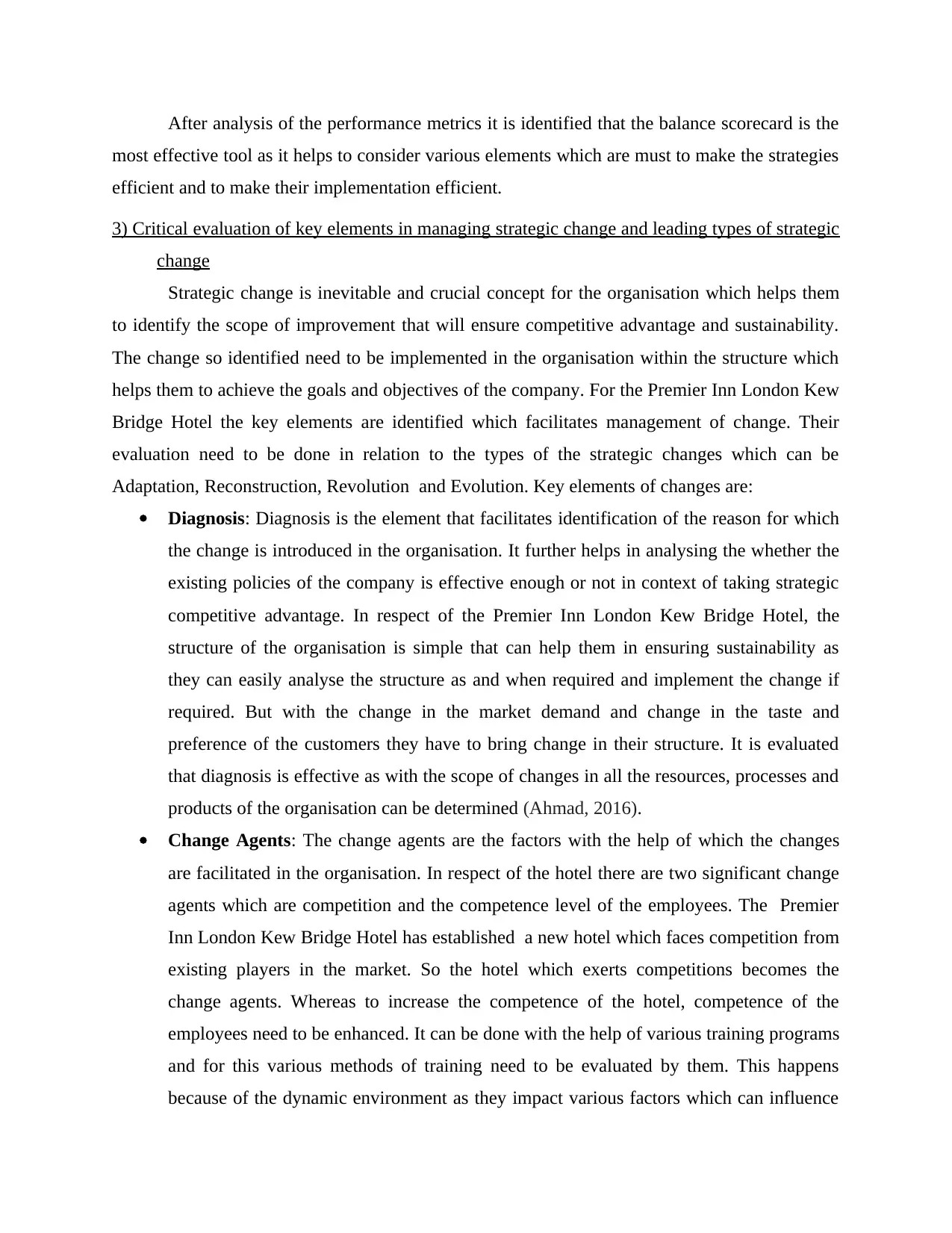
After analysis of the performance metrics it is identified that the balance scorecard is the
most effective tool as it helps to consider various elements which are must to make the strategies
efficient and to make their implementation efficient.
3) Critical evaluation of key elements in managing strategic change and leading types of strategic
change
Strategic change is inevitable and crucial concept for the organisation which helps them
to identify the scope of improvement that will ensure competitive advantage and sustainability.
The change so identified need to be implemented in the organisation within the structure which
helps them to achieve the goals and objectives of the company. For the Premier Inn London Kew
Bridge Hotel the key elements are identified which facilitates management of change. Their
evaluation need to be done in relation to the types of the strategic changes which can be
Adaptation, Reconstruction, Revolution and Evolution. Key elements of changes are:
Diagnosis: Diagnosis is the element that facilitates identification of the reason for which
the change is introduced in the organisation. It further helps in analysing the whether the
existing policies of the company is effective enough or not in context of taking strategic
competitive advantage. In respect of the Premier Inn London Kew Bridge Hotel, the
structure of the organisation is simple that can help them in ensuring sustainability as
they can easily analyse the structure as and when required and implement the change if
required. But with the change in the market demand and change in the taste and
preference of the customers they have to bring change in their structure. It is evaluated
that diagnosis is effective as with the scope of changes in all the resources, processes and
products of the organisation can be determined (Ahmad, 2016).
Change Agents: The change agents are the factors with the help of which the changes
are facilitated in the organisation. In respect of the hotel there are two significant change
agents which are competition and the competence level of the employees. The Premier
Inn London Kew Bridge Hotel has established a new hotel which faces competition from
existing players in the market. So the hotel which exerts competitions becomes the
change agents. Whereas to increase the competence of the hotel, competence of the
employees need to be enhanced. It can be done with the help of various training programs
and for this various methods of training need to be evaluated by them. This happens
because of the dynamic environment as they impact various factors which can influence
most effective tool as it helps to consider various elements which are must to make the strategies
efficient and to make their implementation efficient.
3) Critical evaluation of key elements in managing strategic change and leading types of strategic
change
Strategic change is inevitable and crucial concept for the organisation which helps them
to identify the scope of improvement that will ensure competitive advantage and sustainability.
The change so identified need to be implemented in the organisation within the structure which
helps them to achieve the goals and objectives of the company. For the Premier Inn London Kew
Bridge Hotel the key elements are identified which facilitates management of change. Their
evaluation need to be done in relation to the types of the strategic changes which can be
Adaptation, Reconstruction, Revolution and Evolution. Key elements of changes are:
Diagnosis: Diagnosis is the element that facilitates identification of the reason for which
the change is introduced in the organisation. It further helps in analysing the whether the
existing policies of the company is effective enough or not in context of taking strategic
competitive advantage. In respect of the Premier Inn London Kew Bridge Hotel, the
structure of the organisation is simple that can help them in ensuring sustainability as
they can easily analyse the structure as and when required and implement the change if
required. But with the change in the market demand and change in the taste and
preference of the customers they have to bring change in their structure. It is evaluated
that diagnosis is effective as with the scope of changes in all the resources, processes and
products of the organisation can be determined (Ahmad, 2016).
Change Agents: The change agents are the factors with the help of which the changes
are facilitated in the organisation. In respect of the hotel there are two significant change
agents which are competition and the competence level of the employees. The Premier
Inn London Kew Bridge Hotel has established a new hotel which faces competition from
existing players in the market. So the hotel which exerts competitions becomes the
change agents. Whereas to increase the competence of the hotel, competence of the
employees need to be enhanced. It can be done with the help of various training programs
and for this various methods of training need to be evaluated by them. This happens
because of the dynamic environment as they impact various factors which can influence
Paraphrase This Document
Need a fresh take? Get an instant paraphrase of this document with our AI Paraphraser
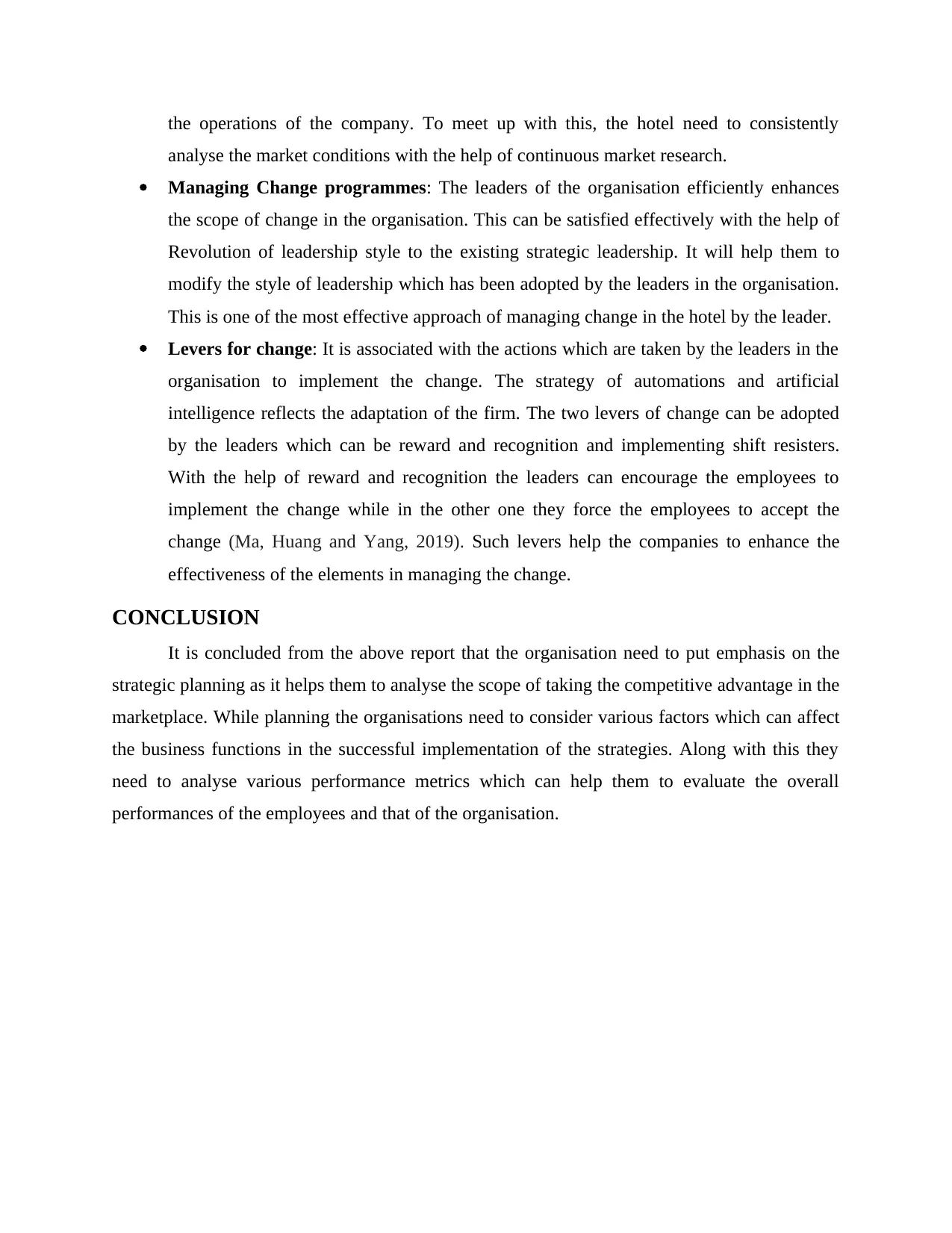
the operations of the company. To meet up with this, the hotel need to consistently
analyse the market conditions with the help of continuous market research.
Managing Change programmes: The leaders of the organisation efficiently enhances
the scope of change in the organisation. This can be satisfied effectively with the help of
Revolution of leadership style to the existing strategic leadership. It will help them to
modify the style of leadership which has been adopted by the leaders in the organisation.
This is one of the most effective approach of managing change in the hotel by the leader.
Levers for change: It is associated with the actions which are taken by the leaders in the
organisation to implement the change. The strategy of automations and artificial
intelligence reflects the adaptation of the firm. The two levers of change can be adopted
by the leaders which can be reward and recognition and implementing shift resisters.
With the help of reward and recognition the leaders can encourage the employees to
implement the change while in the other one they force the employees to accept the
change (Ma, Huang and Yang, 2019). Such levers help the companies to enhance the
effectiveness of the elements in managing the change.
CONCLUSION
It is concluded from the above report that the organisation need to put emphasis on the
strategic planning as it helps them to analyse the scope of taking the competitive advantage in the
marketplace. While planning the organisations need to consider various factors which can affect
the business functions in the successful implementation of the strategies. Along with this they
need to analyse various performance metrics which can help them to evaluate the overall
performances of the employees and that of the organisation.
analyse the market conditions with the help of continuous market research.
Managing Change programmes: The leaders of the organisation efficiently enhances
the scope of change in the organisation. This can be satisfied effectively with the help of
Revolution of leadership style to the existing strategic leadership. It will help them to
modify the style of leadership which has been adopted by the leaders in the organisation.
This is one of the most effective approach of managing change in the hotel by the leader.
Levers for change: It is associated with the actions which are taken by the leaders in the
organisation to implement the change. The strategy of automations and artificial
intelligence reflects the adaptation of the firm. The two levers of change can be adopted
by the leaders which can be reward and recognition and implementing shift resisters.
With the help of reward and recognition the leaders can encourage the employees to
implement the change while in the other one they force the employees to accept the
change (Ma, Huang and Yang, 2019). Such levers help the companies to enhance the
effectiveness of the elements in managing the change.
CONCLUSION
It is concluded from the above report that the organisation need to put emphasis on the
strategic planning as it helps them to analyse the scope of taking the competitive advantage in the
marketplace. While planning the organisations need to consider various factors which can affect
the business functions in the successful implementation of the strategies. Along with this they
need to analyse various performance metrics which can help them to evaluate the overall
performances of the employees and that of the organisation.
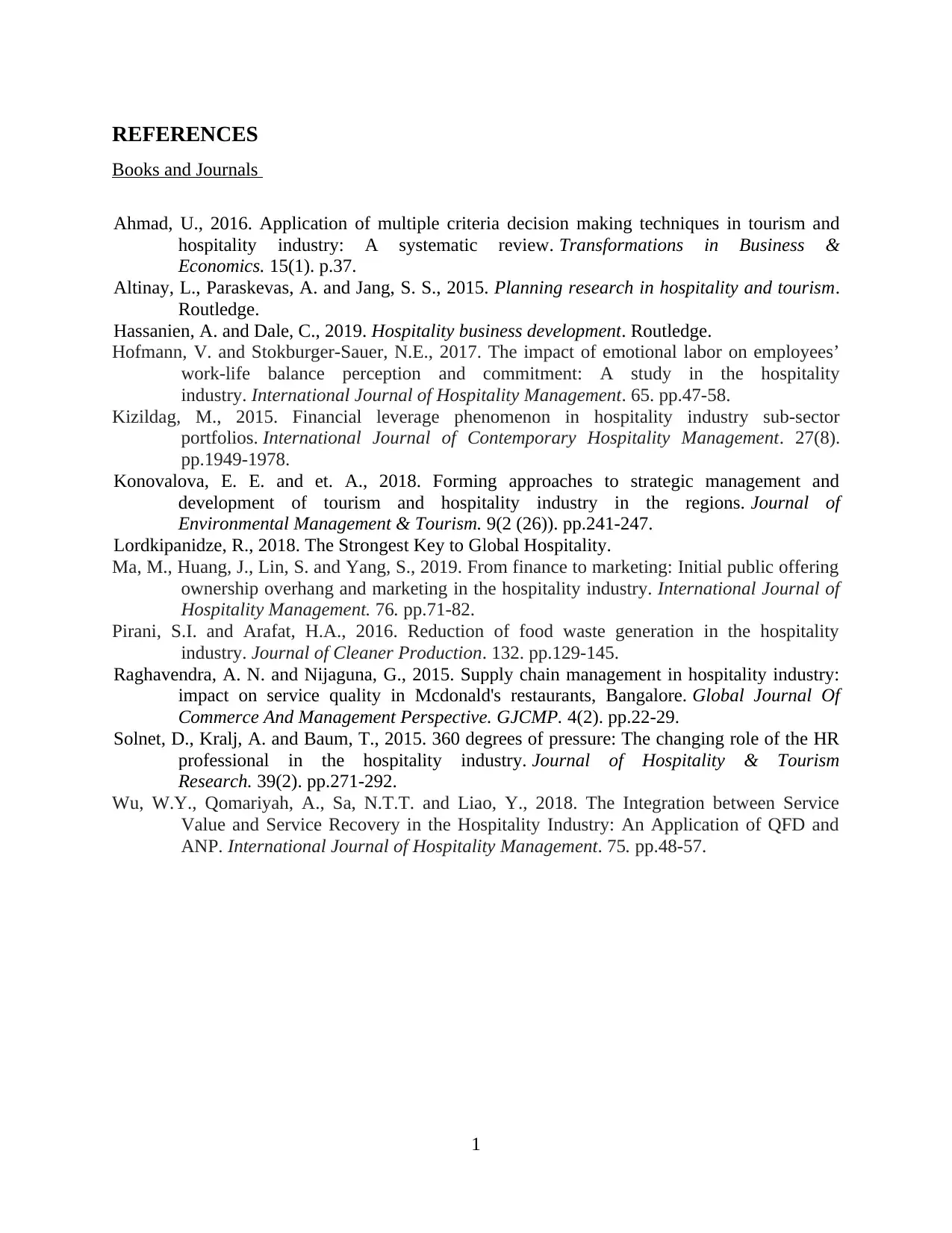
REFERENCES
Books and Journals
Ahmad, U., 2016. Application of multiple criteria decision making techniques in tourism and
hospitality industry: A systematic review. Transformations in Business &
Economics. 15(1). p.37.
Altinay, L., Paraskevas, A. and Jang, S. S., 2015. Planning research in hospitality and tourism.
Routledge.
Hassanien, A. and Dale, C., 2019. Hospitality business development. Routledge.
Hofmann, V. and Stokburger-Sauer, N.E., 2017. The impact of emotional labor on employees’
work-life balance perception and commitment: A study in the hospitality
industry. International Journal of Hospitality Management. 65. pp.47-58.
Kizildag, M., 2015. Financial leverage phenomenon in hospitality industry sub-sector
portfolios. International Journal of Contemporary Hospitality Management. 27(8).
pp.1949-1978.
Konovalova, E. E. and et. A., 2018. Forming approaches to strategic management and
development of tourism and hospitality industry in the regions. Journal of
Environmental Management & Tourism. 9(2 (26)). pp.241-247.
Lordkipanidze, R., 2018. The Strongest Key to Global Hospitality.
Ma, M., Huang, J., Lin, S. and Yang, S., 2019. From finance to marketing: Initial public offering
ownership overhang and marketing in the hospitality industry. International Journal of
Hospitality Management. 76. pp.71-82.
Pirani, S.I. and Arafat, H.A., 2016. Reduction of food waste generation in the hospitality
industry. Journal of Cleaner Production. 132. pp.129-145.
Raghavendra, A. N. and Nijaguna, G., 2015. Supply chain management in hospitality industry:
impact on service quality in Mcdonald's restaurants, Bangalore. Global Journal Of
Commerce And Management Perspective. GJCMP. 4(2). pp.22-29.
Solnet, D., Kralj, A. and Baum, T., 2015. 360 degrees of pressure: The changing role of the HR
professional in the hospitality industry. Journal of Hospitality & Tourism
Research. 39(2). pp.271-292.
Wu, W.Y., Qomariyah, A., Sa, N.T.T. and Liao, Y., 2018. The Integration between Service
Value and Service Recovery in the Hospitality Industry: An Application of QFD and
ANP. International Journal of Hospitality Management. 75. pp.48-57.
1
Books and Journals
Ahmad, U., 2016. Application of multiple criteria decision making techniques in tourism and
hospitality industry: A systematic review. Transformations in Business &
Economics. 15(1). p.37.
Altinay, L., Paraskevas, A. and Jang, S. S., 2015. Planning research in hospitality and tourism.
Routledge.
Hassanien, A. and Dale, C., 2019. Hospitality business development. Routledge.
Hofmann, V. and Stokburger-Sauer, N.E., 2017. The impact of emotional labor on employees’
work-life balance perception and commitment: A study in the hospitality
industry. International Journal of Hospitality Management. 65. pp.47-58.
Kizildag, M., 2015. Financial leverage phenomenon in hospitality industry sub-sector
portfolios. International Journal of Contemporary Hospitality Management. 27(8).
pp.1949-1978.
Konovalova, E. E. and et. A., 2018. Forming approaches to strategic management and
development of tourism and hospitality industry in the regions. Journal of
Environmental Management & Tourism. 9(2 (26)). pp.241-247.
Lordkipanidze, R., 2018. The Strongest Key to Global Hospitality.
Ma, M., Huang, J., Lin, S. and Yang, S., 2019. From finance to marketing: Initial public offering
ownership overhang and marketing in the hospitality industry. International Journal of
Hospitality Management. 76. pp.71-82.
Pirani, S.I. and Arafat, H.A., 2016. Reduction of food waste generation in the hospitality
industry. Journal of Cleaner Production. 132. pp.129-145.
Raghavendra, A. N. and Nijaguna, G., 2015. Supply chain management in hospitality industry:
impact on service quality in Mcdonald's restaurants, Bangalore. Global Journal Of
Commerce And Management Perspective. GJCMP. 4(2). pp.22-29.
Solnet, D., Kralj, A. and Baum, T., 2015. 360 degrees of pressure: The changing role of the HR
professional in the hospitality industry. Journal of Hospitality & Tourism
Research. 39(2). pp.271-292.
Wu, W.Y., Qomariyah, A., Sa, N.T.T. and Liao, Y., 2018. The Integration between Service
Value and Service Recovery in the Hospitality Industry: An Application of QFD and
ANP. International Journal of Hospitality Management. 75. pp.48-57.
1
⊘ This is a preview!⊘
Do you want full access?
Subscribe today to unlock all pages.

Trusted by 1+ million students worldwide
1 out of 12
Related Documents
Your All-in-One AI-Powered Toolkit for Academic Success.
+13062052269
info@desklib.com
Available 24*7 on WhatsApp / Email
![[object Object]](/_next/static/media/star-bottom.7253800d.svg)
Unlock your academic potential
Copyright © 2020–2026 A2Z Services. All Rights Reserved. Developed and managed by ZUCOL.



